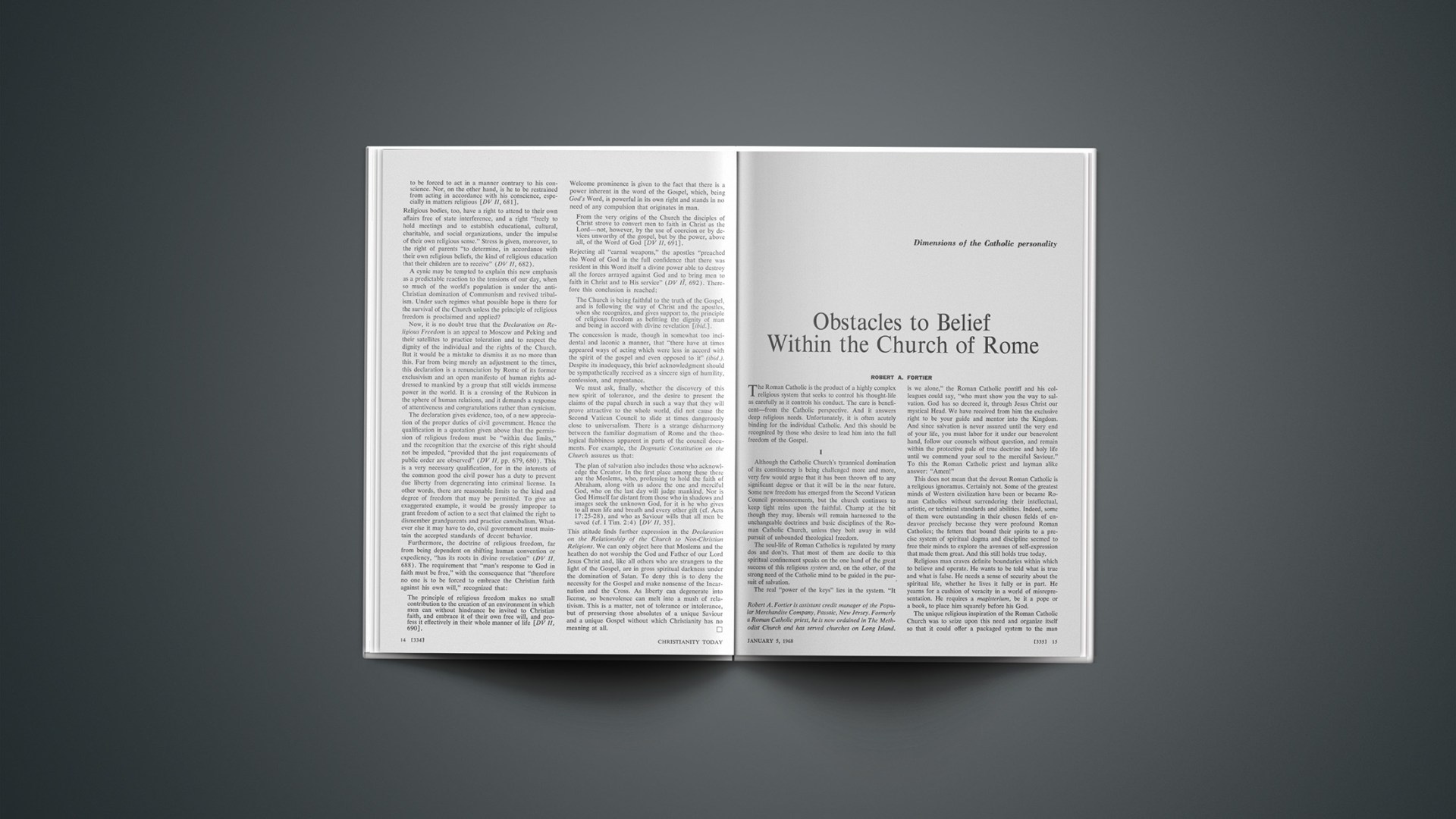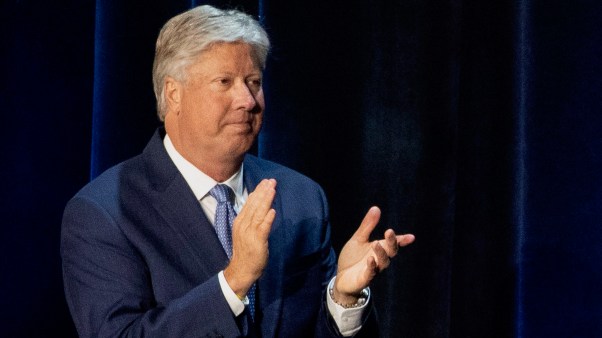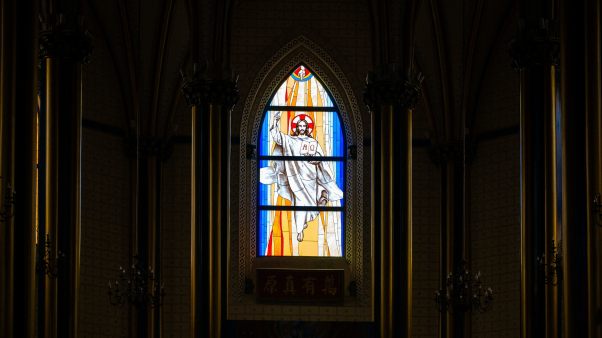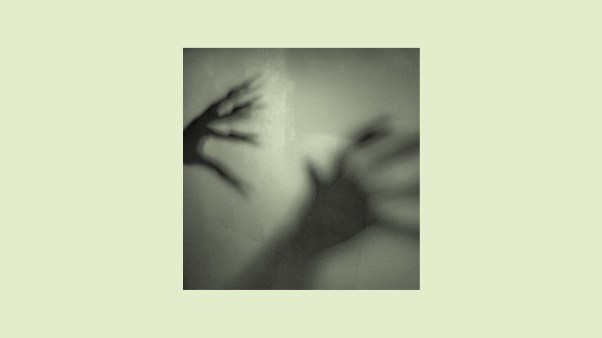The Roman Catholic is the product of a highly complex religious system that seeks to control his thought-life as carefully as it controls his conduct. The care is beneficent—from the Catholic perspective. And it answers deep religious needs. Unfortunately, it is often acutely binding for the individual Catholic. And this should be recognized by those who desire to lead him into the full freedom of the Gospel.
I
Although the Catholic Church’s tyrannical domination of its constituency is being challenged more and more, very few would argue that it has been thrown off to any significant degree or that it will be in the near future. Some new freedom has emerged from the Second Vatican Council pronouncements, but the church continues to keep tight reins upon the faithful. Champ at the bit though they may, liberals will remain harnessed to the unchangeable doctrines and basic disciplines of the Roman Catholic Church, unless they bolt away in wild pursuit of unbounded theological freedom.
The soul-life of Roman Catholics is regulated by many dos and don’ts. That most of them are docile to this spiritual confinement speaks on the one hand of the great success of this religious system and, on the other, of the strong need of the Catholic mind to be guided in the pursuit of salvation.
The real “power of the keys” lies in the system. “It is we alone,” the Roman Catholic pontiff and his colleagues could say, “who must show you the way to salvation. God has so decreed it, through Jesus Christ our mystical Head. We have received from him the exclusive right to be your guide and mentor into the Kingdom. And since salvation is never assured until the very end of your life, you must labor for it under our benevolent hand, follow our counsels without question, and remain within the protective pale of true doctrine and holy life until we commend your soul to the merciful Saviour.” To this the Roman Catholic priest and layman alike answer: “Amen!”
This does not mean that the devout Roman Catholic is a religious ignoramus. Certainly not. Some of the greatest minds of Western civilization have been or became Roman Catholics without surrendering their intellectual, artistic, or technical standards and abilities. Indeed, some of them were outstanding in their chosen fields of endeavor precisely because they were profound Roman Catholics; the fetters that bound their spirits to a precise system of spiritual dogma and discipline seemed to free their minds to explore the avenues of self-expression that made them great. And this still holds true today.
Religious man craves definite boundaries within which to believe and operate. He wants to be told what is true and what is false. He needs a sense of security about the spiritual life, whether he lives it fully or in part. He yearns for a cushion of veracity in a world of misrepresentation. He requires a magisterium, be it a pope or a book, to place him squarely before his God.
The unique religious inspiration of the Roman Catholic Church was to seize upon this need and organize itself so that it could offer a packaged system to the man who wanted to bridge the chasm between the infinite God and his own finitude, between a holy God and his own sinfulness.
The Roman Catholic feels comfortable within the marvelous intellectual system, the beauty, and the ritualistic magnificence of the church; but it tends to close in upon his mind and spirit and become a prison. Probably only the former Catholic can be fully aware of how restrictive the system’s authority can be, how pervasive its brainwashing.
Unfortunately, there is not an informed and consistent evangelical outreach challenging the Roman Catholic to step out into the liberating light of Truth. Possibly the reason is a curiously mistaken notion that the Roman Catholic relishes his bonds and loves his sepulchral darkness. True, the average Roman Catholic needs to be guided, encouraged, and enlightened—but isn’t this precisely what the evangelical Christian can promise him in Jesus Christ and his Gospel? Substituting divine authority for manmade authority is the first step in the stirring transition from darkness to light.
If the evangelical Christian could only sense the true value of soul-freedom under Jesus Christ’s unique headship and transmit this to the burdened Roman Catholic, the Catholic would gladly reach for Christian liberty. If only the evangelical Christian, knowing somewhat what priestly soul-tyranny means and how it operates, would offer the Roman Catholic liberation from ecclesiastical intercession through direct, personal access to the merciful Saviour, many a Catholic would willingly fall at Christ’s feet and confess his sinfulness.
II
The Roman Catholic is constantly dazzled from all sides by emotional stimuli that lead him to ever more glowing religious experiences until senses and faith become inextricably mixed. This accounts for the numerous superstitions that the Church deplores but that have become quasi-dogmas to the faithful. Although the Church withholds its blessing from these pious excesses, this neutrality is constructed as tacit approval. And open condemnation merely drives them underground, where they are relished the more because forbidden. In short, the Roman Catholic, perhaps more than other religious persons, feels what he believes and believes what he feels.
It is not strange that the Church would want the faithful to touch and smell and see and taste and hear how marvelous is the Lord our God. To this end it uses an unexcelled pedagogy in which time-tested formulas transform the commonplace elements of bread, water, salt, oil, wine, and incense into meaningful religious symbols of what is really happening in the soul. The faithful cannot but marvel that everything God has made speaks of him, and they praise the Church for having enriched their lives by consecrating the ordinary things of life to his service.
This is the greatest single achievement of the Roman Catholic Church—its consummate understanding of the religious being, who is never stone or plaster but flesh and bones, mind and soul, senses and emotions. Having comprehended this better than any other religious organization ever has, the Roman church has been able to stimulate the flagging spirit and exhilarate the committed soul.
Does this mean that the Roman Catholic relies so upon sensual and emotional stimuli to enter into the presence of the Almighty that he cannot be conditioned to meet God in spirit and in truth? Not at all. However, the transition from vacillating pietism and devotionalism to authentic surrender to the solid but unadorned Rock of our salvation is difficult. And here is where the evangelical Christian will have to be most careful to approach his Roman Catholic brother in understanding and love.
A Minister’S Wife Speaks Out About Sex
Advocates of sexual freedom, she says, “can’t tell diamonds from rhinestones”
I’m for marriage! I’ve read many prophecies that our social mores will change and have pondered the intensifying propaganda for so-called sexual freedom. Yet I’m still for marriage. I’m for the freedom of marriage. The prospect of having a dozen different love affairs during my life appalls me with its restrictions—and I say this after being married to the same man for nearly twenty-two years.
We may as well start with sex. Give me the liberty of the marriage bed. Give me the freedom of a sexual relationship with one lifetime partner. Give me the complete abandon of the physical and spiritual oneness found only in married love.
In marriage there is freedom from fear. How I’d hate to be hemmed in by the fears I know I’d feel in a transitory relationship. Improvements in birth-control methods have taken away much of the fear of conception. Still, thousands of illegitimate babies are born every year. Even in marriage the possible consequence of the mating act can at times inhibit a woman’s response to it. Outside marriage, where these fears are multiplied many times, what freedom could a woman enjoy?
There is also freedom from comparison. I am not troubled by a gnawing fear that I might not be living up to a former partner’s performance. There is a satisfying security in the knowledge that I did not lure my husband from the embrace of another woman and, because he too wholeheartedly believes in marriage, that no other woman can alienate him from me because her body is more seductive.
There is freedom to grow old within the comfort of my husband’s love. I don’t think I could bear the agony of being discarded when my physical capacities in this realm, as in others, lose the vigor of youth.
Marriage has made me a mother four times. I would hate to be an unmarried mother, and not only because it is still frowned upon by society. What glorious freedom there is in being able to share the joy of a baby’s birth and growth with a husband, who usually feels the same pride and elation in this greatest of all joint enterprises. How fenced in I would have felt had I been required to act modestly with everybody!
There are countless memories of shared joys and sorrows in a good marriage. I’d hate being cheated of these. There have been hundreds of shared small triumphs, and of private jokes that are funny only to us. It takes a while for a man and a woman to build up this kind of easy mental intimacy.
I am not bored but rather comforted by my knowledge of how my husband will react to almost any situation. I don’t have to be tormented with self-doubts when he is quieter than usual; years of living with him have taught me that he is worried about something, not disenchanted with me. I wasn’t always sure those first few years.
In marriage I find freedom to grow as a whole person. I don’t think this would be possible for me with any relationship less intimate and binding. Because I don’t have to be constantly concerned with my seduction rating, I have energies with which to pursue my interests and nurture whatever talents I have. No doubt this makes me more interesting to my husband. It certainly fulfills a deep need in me.
I think marriage also enriches my social life. I have more and better friends among both sexes than I could have as a single person. I consider many men my good friends. We have delightful conversations. I don’t have to worry about impressing them, and they don’t have to be wary of me.
I suppose monogamy is one kind of freedom and the “new morality” is another, and I grant that the price of marital freedom is high. One has to give up a great deal of selfishness in order to achieve peace and happiness with another person. I would not say that my husband and I were each the one perfect choice for the other. At times, we’ve felt madly incompatible! Yet the territorial rights and freedom of marriage have given us space to grow not only as separate beings but in an ever-deepening oneness that has brought us much happiness.
It has given life to four other happy human beings, too. I can’t see how “free love” could ever produce this kind of happiness for people. No doubt, it satisfies physical passion. Yet I wonder how much tenderness you would find in a man unwilling to give his name to and sacrifice himself for his possible unborn child? How much real love is there in a woman concerned only with herself, her sex partner, and the thrill of the moment?
With America’s emphasis on sex, it isn’t any wonder that even very young people come to believe that sexual gratification is the “pearl of great price,” worth the exchange of all other treasures. Unfortunately, by the time many of them find out that other treasures are highly valuable also, it is too late. They have thrown them away on somebody who doesn’t know diamonds from rhinestones.
I believe that the God who made us gave us marriage because he knew it would bring us the highest happiness. Some call this naïveté. Others consider it romanticism. To them I can only offer my own experience in reply: Marriage has brought great happiness to me.—OPAL LINCOLN GEE, Springfield, Missouri.
Even though statues, rosary beads, holy water, and incense must be laid aside if the Roman Catholic is to enter into an undefiled relationship with the One true God, should not be asked to give up these trappings of his faith all at once and thus be left to operate in an emotional vacuum. Too often the zealous evangelical repulses the Roman Catholic from the start with a negative witness and a dull, stark, religious solemnity.
Enthusiasm is what melts the human will to the state of submission. And if the Roman Catholic can be made to channel his substantial emotional energies into a single ardent impulse of love for Jesus Christ (whom he already recognizes as true God and true Man, revealed in the Book that he too accepts as inspired), conversion is at hand. What the evangelical Christian fails to realize is that the Roman Catholic is not only willing but often ready to trade what he considers precious—Mary, the sacraments, the Mass, scapulars, votive lights—for the greatest prize of all: assurance of salvation through faith in Christ. Instead of doubting that the many errors and excesses found in Roman Catholic doctrine and life can ever be overcome, the evangelical Christian must realize that the Catholic indulges in these because he is looking for salvation, not because he is rejecting it.
On the whole, the evangelical churches have made only isolated attempts to reach the Roman Catholic in understanding and love. This is a great pity, for this brother whose love already centers in Christ is remarkably closer to the new birth than the Jew, the Muslim, or many unbelieving Protestants. All he needs is to be shown that Christ died for him personally and that he can be saved now, if only he accepts him as personal Saviour and is willing to submit to renewal in Jesus Christ his Lord.
To my mind, this is the greatest challenge to the evangelical churches today.
Milton D. Hunnex is professor and head of the department of philosophy at Willamette University, Salem, Oregon. He received the B.A. and M.A. degrees from the University of Redlands and the Ph.D. in the Inter-collegiate Program in Graduate Studies, Claremont, California. He is author of “Philosophies and Philosophers.”










